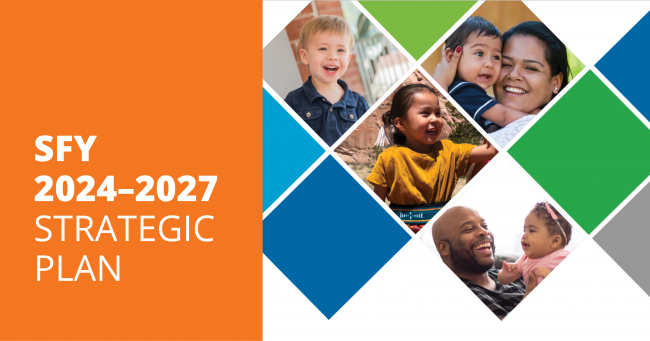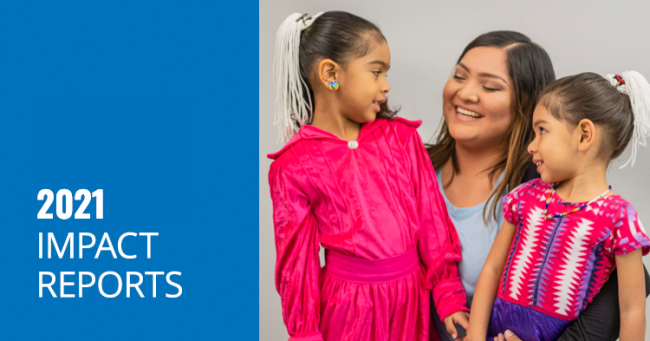Featured

Improving Outcomes for Arizona's Youngest Children
In its role as an essential leader and partner in creating a family-centered, equitable, high-quality early childhood system, FTF has developed a four-year strategic plan to guide its work over the coming years.

First Things First
Read about the impact FTF programs have had on children and families over the past year, as collaborative efforts ensured that critical services continued during challenging times.

Arizona’s Early Childhood Opportunities Report
Learn about the status of Arizona’s young children in this biennial needs and assets report which includes data directly related to children, their health, learning and well-being.

First Things First
Learn more about how each FTF region is unique in its work and goals for serving early childhood needs in local communities and review the accomplishments made.
Annual Reports (PDF)
Outlines FTF investments in areas like quality child care and preschool, strengthening families and early literacy, and preventive health
Statewide Needs & Assets Reports (PDF)
A biennial assessment of Arizona’s children, birth to 5 years old, which serves as a resource for anyone seeking to better understand our children’s challenges and opportunities
- Arizona's Early Childhood Opportunities 2021 Report
- Arizona's Early Childhood Opportunities 2019 Report
- Arizona's Early Childhood Opportunities 2017 Report
- Building Bright Futures: Arizona's Early Childhood Opportunities 2015 Report
- Building Bright Futures 2013 Report
- Building Bright Futures 2011 Report
- Building Bright Futures 2009 Report
- Building Bright Futures 2007 Report
.
Regional Impact Reports - 2021 (PDF)
A review of the strategic priorities of each FTF regional partnership council and the positive impact on school readiness for young children in their communities
- Cochise
- Coconino
- Cocopah
- Colorado River Indian Tribes
- East Maricopa
- Gila
- Graham/Greenlee
- Gila River Indian Community
- Hualapai Tribe
- La Paz/Mohave
- Navajo Apache
- Navajo Nation
- Northwest Maricopa
- Pascua Yaqui Tribe
- Phoenix North
- Phoenix South
- Pima North
- Pima South
- Pinal
- Salt River Pima-Maricopa Indian Community
- San Carlos Apache
- Santa Cruz
- Southeast Maricopa
- Southwest Maricopa
- Tohono O'odham Nation
- White Mountain Apache Tribe
- Yavapai
- Yuma
.
Regional Needs & Assets Reports - 2020 (PDF)
A biennial assessment of the challenges and opportunities facing children birth to age 5 and their families in each FTF region
- Cochise
- Cocopah
- Coconino
- Colorado River Indian Tribes
- East Maricopa
- Gila
- Gila River Indian Community
- Graham/Greenlee
- Hualapai Tribe
- La Paz/Mohave
- Navajo Nation
- Navajo Apache
- Northwest Maricopa
- Pascua Yaqui Tribe
- Phoenix North
- Phoenix South
- Pima North
- Pima South
- Pinal
- Salt River Pima-Maricopa Indian Community
- San Carlos Apache
- Santa Cruz
- Southeast Maricopa
- Southwest Maricopa
- Tohono O'odham Nation
- White Mountain Apache Tribe
- Yavapai
- Yuma
Guides & Plans
Research Reports
- Quality First: Arizona’s Early Learning Quality Improvement and Rating System Implementation and Validation Study
- High-Quality Child Care and Early Education: What Arizona's Parents Want
- Quality First Implementation and Validation
- Arizona's Unknown Education Issue: Early Learning Workforce Trends
- Family and Community Report: A Baseline Report on Families and Coordination
- Arizona Early Childhood Coordination and Collaboration: A Baseline Report
- A Decade of Data: The Compensation and Credentials of Arizona’s Early Care and Education Workforce
Arizona's Early Childhood System
- Strengthening the Child Care Workforce
- The Big Picture for Arizona's Little Kids 2019
- FTF Children's Oral Health Report 2016 - Full
- FTF Children's Oral Health Report 2016 - Summary
- On Track: Ensuring School Readiness for Arizona's Children
- The Big Picture for Arizona's Little Kids 2015
- Building Arizona's Early Childhood Professional Development System
- The Healthy Development of Arizona's Youngest Children

